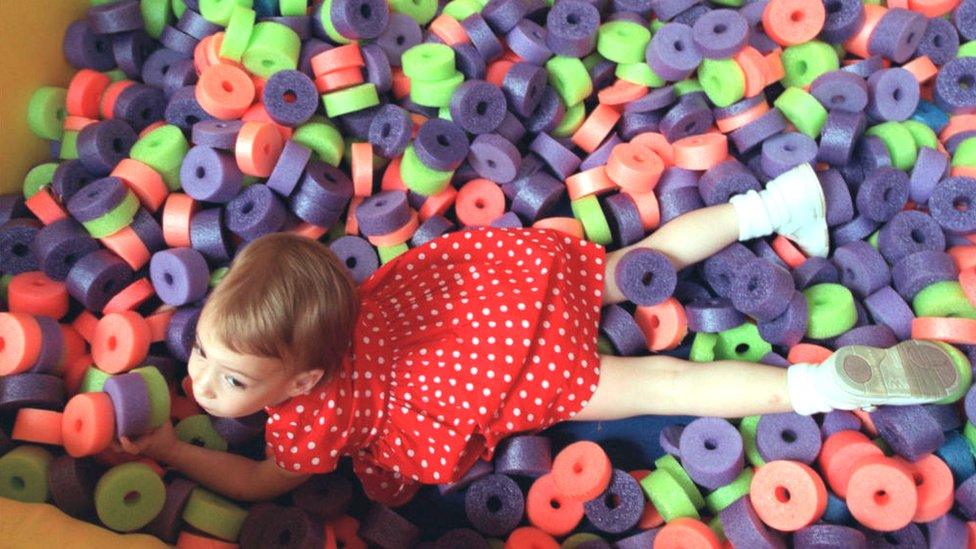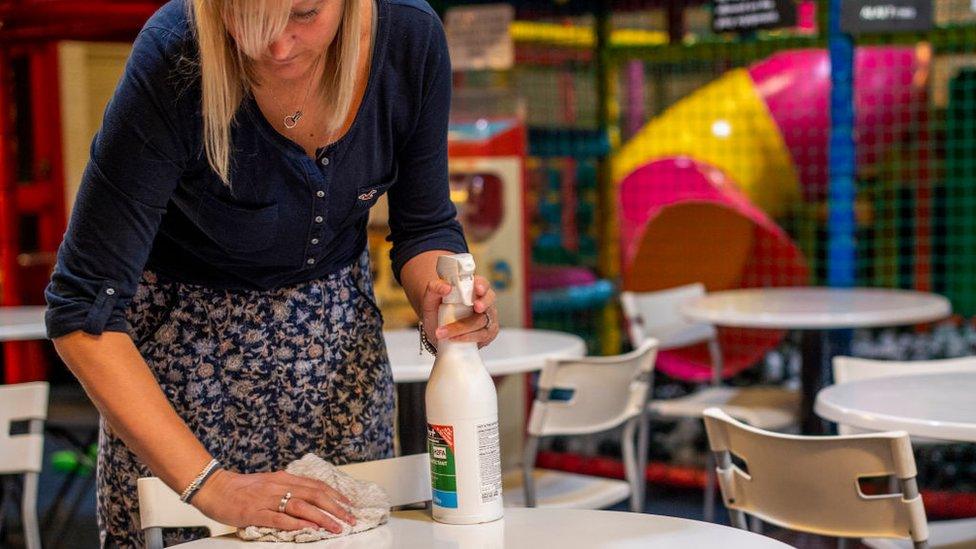Covid in Scotland: Soft play owners plan legal bid to allow reopening
- Published

Children have only been allowed to return to soft play centres in level one areas
Business owners in the soft play sector are threatening legal action over lockdown restrictions which have stopped them from reopening.
Every centre in Scotland was closed at the start of the first lockdown in March 2020, amid concerns about the spread of Covid-19.
Some have reopened as parts of Scotland moved down to level one restrictions.
But many remain closed, with the industry warning the sector will be "no more" if trading does not resume soon.
The Scottish government has said that, "as with all infection prevention measures", the restrictions will only be in place "as long as is necessary".
Owners now say they want the government to publish scientific evidence that soft plays are unsafe to open.
They will stage a protest at Holyrood on Tuesday and are consulting lawyers over a potential judicial review of what they see as unfair treatment.
Darren Margach, a member of the Scottish soft play owners management group, said that despite talks with the government over the last 15 months, "no science has been produced" showing why soft plays are more high risk than other leisure activities.
He told the BBC's Good Morning Scotland programme: "Nobody can give us the reasons that we're more dangerous than a trampoline park or ten pin bowling.
"We accept we have to be at reduced capacity when we're operating and our cafés operate just the same as any other café in hospitality.
"There is obviously a discretionary fund available, however when you divide it among all the sectors in need of support it doesn't net down to very much at all - these funds are not a replacement for us being open and when you've not traded for 448 days these little scraps are not good enough."
Last October, the Scottish government announced firms would receive grants of up £50,000 to help them cope with the "exceptional circumstances" of the pandemic.
The packages, which are also available to nightclubs, are linked to firms' rateable value.

Soft play owners believe their premises are as safe as other sectors which have been allowed to reopen
However, Sarah Davidson - who owns the Whale of A Time centre in Shawlands, Glasgow - says she has lost "hundreds of thousands of pounds" and all 10 of her staff because of the delay in reopening.
She told BBC Scotland's Drivetime programme that bosses were "at the end of our tether".
Ms Davidson said: "There is a demand for us to be changed into a tier that reflects where we think our businesses should be.
"If not, we want to see the actual documentation that proves that it's unsafe for us to trade.
"In all of our discussions with the Scottish government, which have been going on since September last year, they have never once been able to produce a document which clearly says why we are not safe."
Soft play in England
Soft play centres reopened in England in mid-August last year.
But bosses in Scotland insist they have been harshly treated compared with similar sectors.
Sarah Davidson said: "Many of our businesses are hanging by a string before they go bust. We need to trade - we need to open.
"Soft play is open in the rest of the the UK and it's safe there.
"Trampoline parks and role-play cafes, which are similar businesses to us, are all open. They are deemed safe, we are unsafe - why?"
She added: "I don't want money from the Scottish government, I just want to open my business and trade.
"I've got a business that a year ago was thriving - I employed 10 local young people.
"Now I've got nothing. My business is worthless. I just want to get back to the job I love."
Positive tests
A Scottish government spokesman said: "We have always said we will keep plans under review and accelerate the lifting of restrictions if possible, and we will continue engaging with the soft play sector on this."
The industry's plea comes as Nicola Sturgeon is set to give an update on the pandemic at Holyrood.
The first minister is not expected to announce any major policy changes when she addresses MSPs at 14:20.
Meanwhile, a further 641 cases of Covid have been recorded in Scotland.
More than half of them were in the Greater Glasgow and Clyde and Lothian NHS areas.
No new deaths were reported, although registry offices are usually closed at the weekend.
An analysis of the positive tests in the past week shows that a high proportion were among children and young people.

